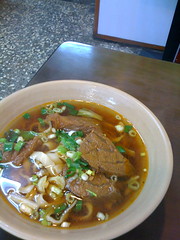
The traffic signals are Osaka style.
A digital display, counting down the seconds.
The signals in Osaka show the time left before the light turns green, but the ones here show the number of seconds before it turns red.
But compared to Osakans, who’re always in a hurry, the people here seem laid-back.
Even on subway station platforms, the people are relaxed. They don’t seem to get frantic.


Plenty of people cross the streets the slow way, on the pedestrian bridges.


On a subway train, a girl playing a mahjongg game on her DS.
And the businessman sitting next to me on the plane had slipped an iPhone out of his pocket and started a mahjongg game, too.
On television, four sexy-talent types sitting around a mahjongg table.

I check out Ximending too, but that type of neighborhood where the young people come to keep up with the latest fashions is pretty much the same wherever you go.
In Japan, it’s Harajuku-Shibuya, and in South Korea, it’s Seoul’s Myeong-dong, for example.

I pass through a rather quiet movie-house district and come out by the river.
No one’s out for a walk or anything.
The riverside road is speeding with motorbikes.


When I get back to my hotel, I turn on the television for the heck of it, and there’s a movie on.
The photography has a subtle touch, and I am drawn right in.
There are Chinese subtitles, so I can just barely follow the story.
(Even if we cannot speak Chinese, Japanese people use Chinese characters all the time, so when there is text, it’s possible to understand the meaning a bit.)
Or rather, the story itself is a typical melodrama, so it is easy to understand.
Chang Jia (Long Vacation)
(Not the Chinese-language version of the Japanese drama Long Vacation, which is written with the same Chinese characters.)
Set in an old working-class neighborhood of Taipei, the protagonist is a woman whose husband, a layabout food-stand hawker neglects his work and spends all his time gambling at a nearby park. They have one son, who is in grammar school. The woman is a kind, vivacious, persevering mother who works constantly to make ends meet, even as she manages all the housework and takes care of her family, but actually she has cancer, and her days are numbered. The story depicts her passing the days as she keeps this secret from her family and reflects on the last few months of her life.

A quite cinematic piece of cinema. The cloudy skies and ambiance of Taipei are etched into the film. The acting is nothing like the standard fare of Japanese movies and television dramas these days; it has a sense of reality. One gets drawn in and totally enrapt by the scenes it portrays, and then it’s over all too soon.
When I returned to Japan and looked it up, I was surprised to learn that it’s not a movie, it’s a TV drama. And I was even more surprised to learn that it was made by a young woman director named Zheng Fen Fen.
It’s prejudice; I just couldn’t imagine such a tight composition being done by a young woman director.
Television Station Website(Chinese only)
Chang Jia (Long Vacation) – Taiwan Public Television Service’s Ren Sheng Ju Zhan (Life Story) – Sina Blog
Article (Japanese only)
Ren Sheng Ju Zhan – Mu Qin Xi Lie (Life Story – Mother Series)
“Life Story, a long-running program produced and broadcast by Taiwan Public Television Service, while suffering generally low ratings, is impressive for its high quality.
The expressiveness of the acting and the story as a whole in this year’s Mother Series casts an even stronger spell than in the programs of past seasons.
The ratings of the June 1 episode, starring Peng Qia Qia and Wan Fang, dropped to near 1%, while on the internet, it has been called the most ‘tear-jerking’ episode in the entire past ten years of Life Story.”
To tell the truth, even though there was a period when a lot of Taiwanese movies were playing in Japan (Hou Hsiao-Hsien, for example), I’ve never actually gone and seen any.
I’d decided against seeing any Taiwanese movies before my trip, because I’d thought it would be better to avoid going there with preconceptions. But I think I’ll start watching them now.
Translated by Seth Yarden
No comments:
Post a Comment